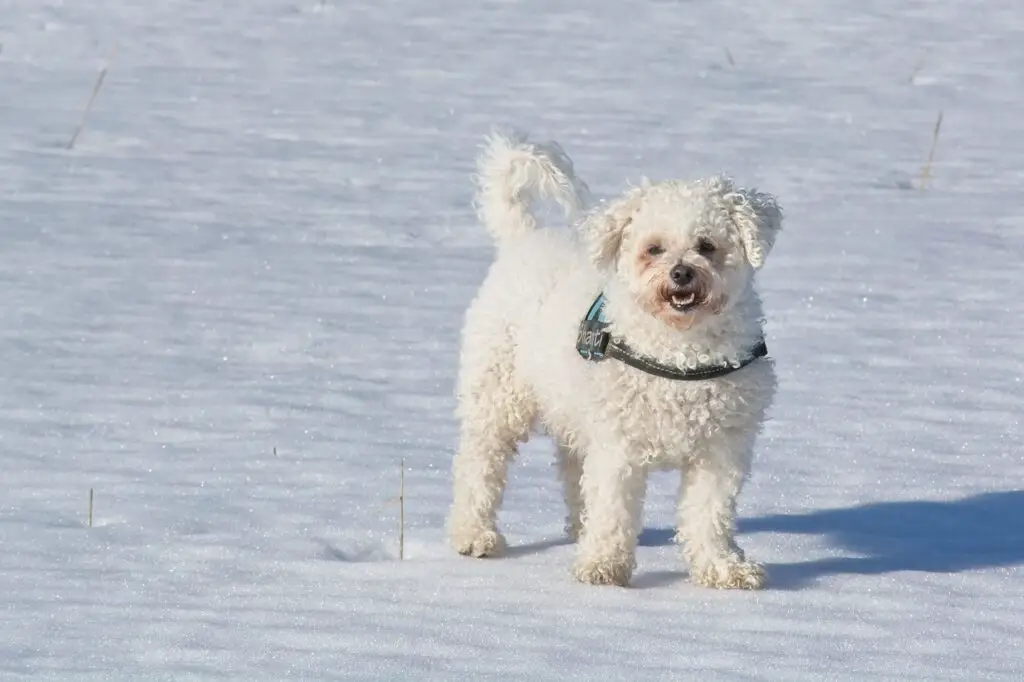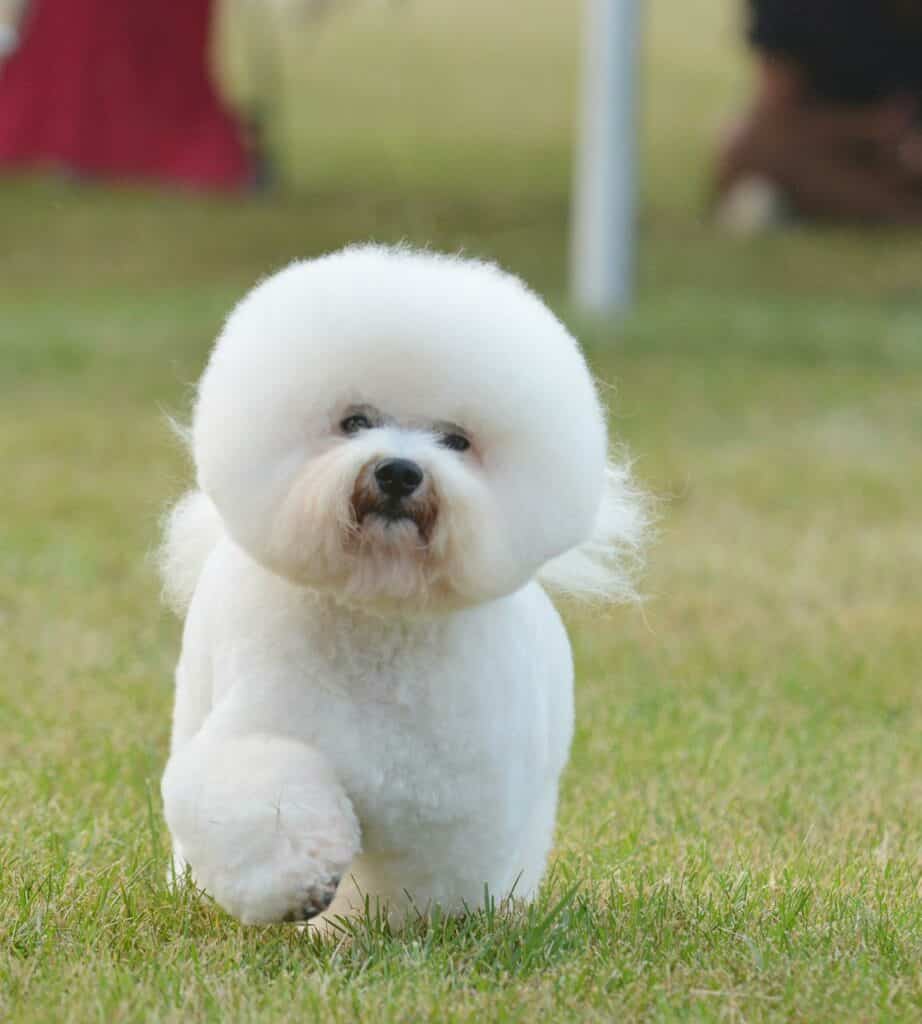Bichon Frises are known for being friendly, and they make great pets for families with children.
For these reasons, you may want to own one for companionship.
However, the fear of finding hair all over your house keeps you wondering whether Bichons shed.
So, do Bichons shed?
Yes, Bichons shed like other creatures with hair.
However, Bichons are low-shedders because they have an undercoat that catches most of the hair.
Before owning a Bichon, you want to know the factors that influence his shedding.
You also want to know how to minimize the shedding for hygiene purposes.
Keep reading for these and other concerns about shedding in Bichons.

Bichon Frise’s Coat
Bichons are born with a single-layered fluffy coat.
However, they develop a top-layer skin at around one year.
The top layer, also known as guarding hairs, is long, coarse, and stiff.
The coat provides insulation for the Bichon against extreme weather conditions.
It also protects him from dirt, debris, and other elements that cause skin irritation.
The coat’s thickness varies depending on the season.
A Bichon’s coat is thicker in winter to provide more insulation.
In summer, it’s thinner to keep the dog cool.
The coat’s texture also changes with age.
Puppies have softer and fluffier skin than adult Bichons.
As puppies mature into adults, their coat becomes coarser and less fluffy.

Factors that Affect Shedding in Bichons
Shedding in Bichons is normal.
All animals with hair shed, but some lose more hair than others.
The amount your Bichon sheds depends on the following factors:
The Time of the Year
Seasonal shedding is common in dogs.
Spring and fall are the seasons when dogs shed the most, and Bichons are no exception.
You’ll notice an increase in your Bichon’s shedding during these times as he blows his coat to adjust to the changing temperatures.
The increased shedding in spring makes a dog’s coat light in preparation for the warm weather.
In fall, the shedding helps him get rid of his summer coat to grow a thicker one for winter.
Age
Older dogs shed more than puppies.
As a dog ages, the lifespan of his hair shortens.
Thus, he’ll lose dead hair more frequently through shedding.
Over the years, hair follicles also become less active and weak.
Weak follicles cannot hold hairs for long, which results in frequent shedding.
Thus, you’ll see an increase in your Bichon’s shedding as he ages.
Hormonal Imbalance
Pregnancy and lactation cause hormonal imbalance in Bichons.
These hormonal changes stimulate hair growth which leads to increased shedding.
After your Bichon delivers her puppies, she’ll shed the extra hair that grew during pregnancy.
The hormonal imbalance will correct itself, and the shedding will eventually stop.
Certain health conditions can also cause hormonal imbalance and increased shedding in Bichons.
These include hypothyroidism, Cushing’s disease, and diabetes.
If you notice an increase in your Bichon’s shedding, consult your veterinarian to rule out any health problems.
Nutrition
A poor diet can increase shedding in Bichons.
Dogs need a balanced diet to stay healthy and maintain a strong coat.
Bichons need high-quality protein to support their hair growth.
They also need essential fatty acids, vitamins, and minerals for a healthy coat.
If your Bichon isn’t getting enough of these nutrients in his diet, he may start shedding excessively.
You can improve your Bichon’s nutrition by feeding him high-quality commercial dog food or a homemade diet.
Talk to your veterinarian about the best diet for your Bichon.
He can recommend a food that meets your dog’s nutritional needs.
How to Manage Shedding in Bichons
It’s disturbing to see dog hairs all over your couches and bed.
Fortunately, you can manage your Bichon’s shedding by:
Brushing His Coat Regularly
When Bichons shed, the hair falls into the coat.
Brushing is an excellent way to remove these hairs before falling on your furniture.
Brushing also removes dead hair before it’s shed.
This helps reduce the amount of hair your Bichon will shed around the house.
It’s best to brush your Bichon daily, but at least twice a week.
This will keep his coat healthy and minimize shedding.
A pin brush is the best for a Bichon.
The bristles on the brush will penetrate the dog’s hair to remove dirt and dead fur.
Brush from head to paw to prevent dirt from entering his eyes and ears.
Regular Baths
Regular baths also help reduce shedding by removing dead hair from your Bichon.
Bathe your Bichon once a month or as needed.
Use an anti-shed shampoo that’s gentle on the skin and won’t strip the coat of its natural oils.
After the bath, use a conditioner to detangle your Bichon’s fur.
This will make it easier to brush his coat and remove shedding hair.
Right Diet
Diet is essential for a healthy coat that sheds less.
Your Bichon needs a balanced diet with sufficient omega fatty acids.
Fish, eggs, flaxseed, ground beef, and chicken will nourish your pup’s skin.
Excellent sources of vitamins include carrots, strawberries, and dark leafy greens.
These foods will improve the quality of your Bichon’s coat.
Avoid processed foods, corn, wheat, and soy as they can trigger allergies and increase shedding.
Temperament in Bichon Frises
Bichon Frises are agreeable and friendly dogs.
They’re outgoing and love to meet new people.
They also get along well with other dogs and make excellent playmates.
The Bichon Frise is a happy-go-lucky breed that loves everyone he meets.
He’s always up for a game and loves to play fetch.
He’s a low-tempered dog that rarely barks.
Frequently Asked Questions
Are Bichons low shedding?
Yes, Bichons are low shedding.
These dogs have double-layered coats with the top layer trapping the hair that’s shed.
Do Bichon Frise dogs shed a lot?
No, Bichon Frises are low-shedders.
However, you may notice an increase in their shedding in spring and fall.
Bottom Line
Bichons are low-shedding dogs.
However, the shedding may increase in fall and spring.
You can minimize shedding by brushing your Bichon regularly and bathing him monthly.
Feeding your Bichon a balanced diet will also help reduce shedding.
- What Dog Breeds Have Pink Skin? - March 24, 2023
- What Are the Most Inspiring Dog Breeding Quotes? - March 20, 2023
- Can Pheromone Spray Help Improve Dog Breeding Results? - March 19, 2023








